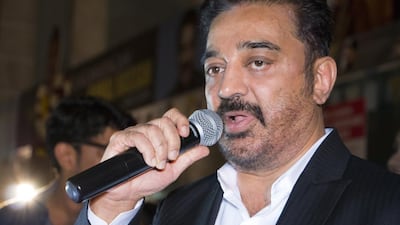Another film star is preparing to stride the political stage in Tamil Nadu, the south Indian state already renowned for electing cinema personalities as chief ministers.
Kamal Haasan, a 62-year-old actor known for both his versatility and his eccentric choices of roles, has ended months of anticipation by announcing that he is forming a new party “not out of choice but compulsion”.
In an interview with news website The Quint on Thursday, Haasan referred to the cracks in the state's ruling party, the All India Anna Dravida Munnetra Kazhagam (AIADMK), after the death of its leader J Jayalalithaa last year.
“This is the right time for me to come into active politics because everything that can possibly go wrong is going wrong,” he said. “We need better governance. I am not promising swift remedies. But I promise to start the process of change.”
Haasan has been building up to this moment for some time. Whereas he had been neutral about his political allegiances, his Twitter feed has been increasingly filled with political commentary and criticism of the ruling party. Earlier this month he visited Pinarayi Vijayan, the chief minister of Kerala, in a much-publicised meeting that was interpreted as a precursor to joining Mr Vijayan’s party, the Communist Party of India (Marxist).
But Haasan categorically ruled out joining any existing party. “A political party is about an ideology. And I don’t think my goals in politics can match the ideology of any political party,” he said.
_______________
Read more:
Jayalalithaa Jayaram: From reluctant screen star to Indian political powerhouse
New chief of India state wins confidence vote after punch-up
Indian politician's death sparks outpouring of grief — video
_______________
Just after his visit to Kerala, Haasan got more specific. Many of his personal heroes were leftists, he said, and his colour “is definitely not saffron” — a reference to the Hindu nationalism of prime minister Narendra Modi’s Bharatiya Janata Party (BJP).
Sources close to the actor have said he will launch his party by the end of this month, in time for municipal elections across Tamil Nadu that are required to be held before November 17. The state government has not yet fixed a date for the election — a measure of the confusion in which the AIADMK finds itself.
Haasan has been one of the biggest stars of Tamil film over the last 40 years. He has acted in and directed critically acclaimed films, including seven that were India’s official entries to the Oscars. He has also displayed a penchant for comedy and had many box-office hits.
He is often portrayed as the thinking man’s actor — a counterpoint to Rajinikanth, the other Tamil superstar of his generation, who occupies the public persona of the “mass-market hero”, an actor who enthralled the film-going public at large, righting social wrongs and crushing villains in hectic action movies.
In fact, it has been Rajinikanth who has, for years now, been dropping hints about his imminent entry into politics. Haasan seems, at the moment, to have moved more quickly than his colleague, but he has also fallen neatly in line with the tradition of Tamil Nadu politics.
From 1969 to 2016, the chief minister’s post in Tamil Nadu was largely filled by three people from the state’s film industry. M Karunanidhi, a screenwriter and poet, became chief minister in 1969. He roughly alternated terms with the matinée idol MG Ramachandran and then with Ramachandran’s protégé Jayalalithaa, also an actor.
The only other people to hold the post have been associates of these figures: Ramachandran’s colleague and then his wife each succeeded him for a brief term after his death in 1987; and a close confidant of Jayalalithaa took her place whenever she was in prison fighting corruption convictions.
The current chief minister, K Palaniswami, is an exception in being a career politician with no background in films.
Half a century ago, radio airwaves were controlled by the federal government, out of Delhi, but Tamil cinema "could reach every nook and corner of Tamil Nadu", said Sushila Ravindranath, the author of Surge, a book about the state's economic and industrial successes.
As a result, politicians such as CN Annadurai, the founder of the Dravid Munnetra Kazhagam (DMK) party, used theatre and cinema as instruments of communication. The film industry became so suffused with political influence that it, in turn, sent its stars into politics.
The extensive reach of cinema in Tamil Nadu, as well the tradition in the state of imparting political messages through film helped stars form massive support bases, their popularity easily transmuted into political capital, whether in the form of votes or of influence within their parties. And the rewards were significantly greater in terms of power — or in the capacity for accumulating great personal wealth through corruption.
Despite the unconventional background of these film stars-turned-politicians, Tamil Nadu has become one of India’s best-developed states. Among large states, Tamil Nadu ranks second only to Kerala in human development indicators. Its US$210 billion (Dh770bn) economy is the third-largest among all states.
Much of this success has come about because the state’s three chief ministers from the film world turned out to be rather good politicians and made some sound decisions, Ms Ravindranath said.
Both the AIADMK and the DMK, for example, pressed forward with educational reforms that opened up universities to hitherto oppressed castes and classes. Ramachandran encouraged poor families to send children to school by promising them free lunches. The state’s big business houses “were left alone and allowed to do their own thing”, which prevented the “industry-politics nexus” common to other states.
"These measures were game-changers," Ms Ravindranath said. "The actors, warts and all, were capable leaders."

